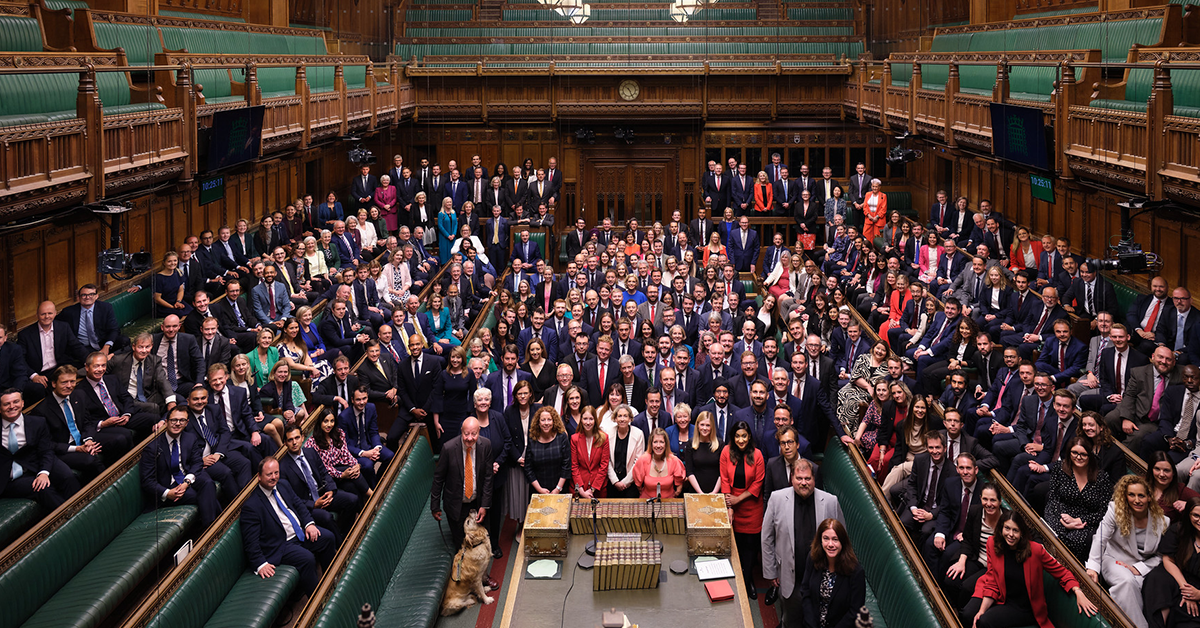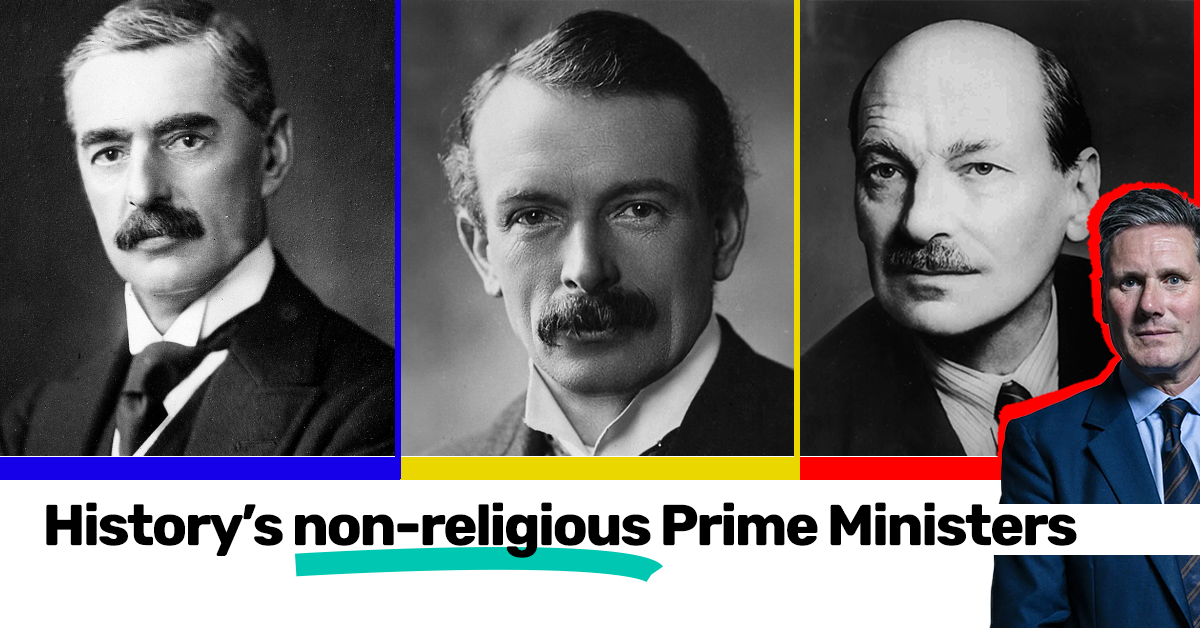
The UK has elected the most openly non-religious House of Commons in history, with roughly 40% of MPs during their swearing-in ceremony choosing to take the secular affirmation instead of a religious oath to God, up from 24% after the 2019 election. The non-religious include the Prime Minister Sir Keir Starmer and 50% of the Cabinet.
Affirmation for nonreligious people has only been available since 1888 after a campaign by the atheist MP Charles Bradlaugh, who was previously prevented from taking his seat because of his refusal to swear to God, but whose constituents kept electing him in protest. Almost all MPs choosing it today do so because they are non-religious, although about a dozen are thought to choose it because their religious beliefs prohibit oaths.
Humanists UK said that the latest figures are a sign that ‘the UK is changing’ and that ‘with the country now majority non-religious, the fact that Parliament is gradually becoming more representative of society is a good thing.’
All but 18 MPs who will take up their seats have now sworn or affirmed. The remainder are expected to do so on 16 July.
Analysis
The 40% of affirming MPs includes 47% of Labour and 47% of Liberal Democrat MPs, as well as all four Green MPs, both SDLP MPs, and 6 of 9 SNP MPs (although as policy its MPs often affirm regardless of belief). By contrast, only 9% of Conservative MPs, one of five Reform UK MPs, chose to affirm. Neither did any of the DUP, Plaid Cymru, Alliance, or TUV MPs. The Sinn Fein MPs do not take part in the swearing-in due to refusal to swear allegiance to the UK.
Just under 6% of MPs gave oaths which indicated they belonged to Muslim, Jewish, Hindu, or Sikh religious traditions. This is broadly representative of society as a whole.
By contrast, just 24% of MPs affirmed following the 2019 general election. The figure was similar after the 2015 and 2017 general elections.
Although a small number of those affirming will have done so in spite of being religious or because their religion forbids taking oaths, the reverse is also true of those taking oaths. A large number of MPs typically swear on the Bible in spite of being non-religious, including some who have been public about the fact that they are not religious and don’t believe in any gods.
The 40% of MPs affirming comes close to the 42% of Britons who say they don’t believe in gods. But Parliament still appears to be more religious than the population as a whole. The British Social Attitudes Survey records 53% of people as belonging to no religion, versus 37% Christian and 9% of another religion. In 2018 it recorded that 42% of Brits don’t believe in a god, and 39% do.
Humanists UK Chief Executive Andrew Copson explained that:
‘For the first time ever, the number of those affirming versus swearing an oath has come close to reflecting the beliefs of the population as a whole. We’ve known for a while that the UK is one of the least religious countries in the world. We now have one of the least religious national parliaments in the world, too.’
Ripe for reform?
The UK Parliament dates back to 1707 while its predecessor, the English Parliament, dates back to 1236.
The function of swearing an oath to God and to the monarch and their lawful successors partly originates in fear of religious conflict between Catholics and Protestants, and fear over wars of succession or between Parliament and the monarchy.
The Labour Party pledged in their Manifesto to ‘modernise’ the House of Commons. It remains to be seen if this will include the system of oaths and affirmations, or systems like parliamentary prayers.
A report from the All-Party Parliamentary Humanist Group previously found that the system of using ‘prayer cards’ to book seats in the House of Commons ahead of debates was systematically discriminating against non-religious backbenchers.
Starmer (at least) 7th non-religious PM

It was a century ago in 1924, according to historian Robin C Douglas, that the UK had its first PM who took the non-religious affirmation (Ramsay MacDonald).
Exactly 100 years later, with the majority of the population now self-describing as not religious, Keir Starmer is the latest to have done so.
To his biographer Tom Baldwin, Starmer explained his moral philosophy in saying:
‘The essence of being human, irrespective of who you are, where you come from, and what your circumstances, is dignity. It means all people have rights which cannot be taken away. The idea of irreducible human dignity became a sort of lode star which has guided me ever since; it gave me a method, a structure and framework by which I could test propositions. And it brought politics into law for me.’
Following the election, Humanists UK published its list of the seven definite non-religious Prime Ministers in British history (including Starmer). This list featured David Lloyd George, Ramsay MacDonald (who was President of Humanists UK before being elected MP), Neville Chamberlain, Winston Churchill, Clement Attlee, and James Callaghan. Attlee, for instance, said he liked the ‘ethics’ of Christianity without the ‘mumbo jumbo’, while MacDonald during his time with Humanists UK advocated for ‘a conviction that the good life is desirable for its own sake, and rests upon no supernatural sanction.’
The late First Ministers of Scotland and of Wales, Donald Dewar and Rhodri Morgan, were also non-religious. Morgan had been a patron of Humanists UK and made history by having a public humanist funeral (akin to a state funeral).
We cannot know the private beliefs of every Prime Minister. Prior to 1888 it was illegal for any MP to take office while rejecting belief in a deity. Eventually, Charles Bradlaugh’s campaign, together with a petition from Quakers, led to the Oaths Act 1888.
Bias in the criminal justice system
An academic study in April 2023 found that jurors who swore a religious oath are biased against criminal defendants who chose to take a secular affirmation. Humanists UK at the time called on the Ministry of Justice to reform how oaths and affirmations are taken before jurors to eliminate this bias. It will be raising these issues with new ministers in the MoJ.
Notes
For further comment or information, media should contact Humanists UK Director of Public Affairs and Policy Richy Thompson at press@humanists.uk or phone 0203 675 0959.
Read our previous comment on the UK’s non-religious Prime Ministers.
Read Humanists UK’s previous report on juror bias, oaths, and affirmations.
Humanists UK is the national charity working on behalf of non-religious people. Powered by over 120,000 members and supporters, we advance free thinking and promote humanism to create a tolerant society where rational thinking and kindness prevail. We provide ceremonies, pastoral care, education, and support services benefitting over a million people every year and our campaigns advance humanist thinking on ethical issues, human rights, and equal treatment for all.
